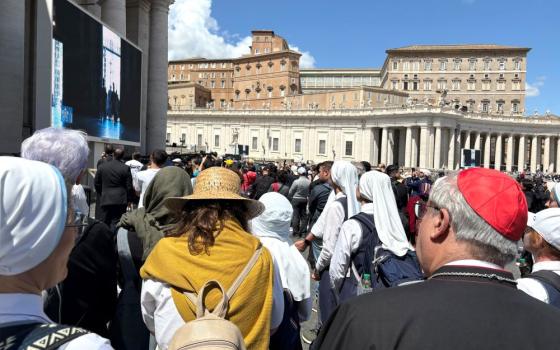Fr. Dwight Longenecker has done the Church a great service in publishing an article at Patheos in which he advises those conservative Catholics who do not like Pope Francis on how they can best cope with this pontificate.
The service Fr. Longenecker provides, however, is not the one he seems to have intended. His aim was to provide a rationalization for the discontented. In fact, his article is a window into the world of a certain type of U.S. conservative Catholic, we might call them the “Tea Party Catholics,” the 15% in polls who do not approve of Pope Francis, and the conversations they are having. Regrettably, I suspect those who disapprove of Pope Francis constitute a larger share of the clergy and the episcopate than the laity. When bishops temporize in public, as we have seen for example in Bishop Robert Morlino’s ill-advised interviews, or in comments from Cardinal Raymond Burke, you can bet that those same prelates, in private, are hearing, or saying, the kinds of things Fr. Longenecker records in this remarkable piece. And, before he got booted off the Congregation for Bishops, Cardinal Burke was able to place many like-minded prelates in some prominent sees.
Longenecker writes:
Some have given up on Pope Francis. Others say he is “the false prophet” who will accompany the anti Christ in the end times. Others don’t like his dress sense, grumble about his media gaffes and some think they are all intentional and that he is a very shrewd Jesuit who wants to undermine the Catholic faith.
Clearly, Father is not speaking to the same Catholics I speak with, although I did hear a bishop speculate on the fact that “we can’t dismiss the possibility that there could be another anti-pope.” I like the way Fr. Longenecker, following a model set forth previously by Archbishop Chaput, and by the Wizard of Oz before that, places these concerns in the mouths of others, nonetheless giving them oxygen by reporting them. The idea that Pope Francis “is a very shrewd Jesuit who wants to undermine the Catholic faith” really did not need to be reported in order to continue with the article, did it? And, the observation reads like something you would find in an early eighteenth century Jansenist tract, an analogy that bears further reflection because of the Jansenist tendencies of the anti-Francis brigade.
Fr. Longenecker sets forth ten things to remember and begins with a statement designed to lower the temperature of those beset by fevered imaginings about Pope Francis accompanying the anti-Christ. He writes:
The first thing to remember is that he is the pope. He is not going to change Catholic doctrine or moral teaching. He can’t and he knows that. He may be a “reformer” but there’s only so much he can do. His statement on women priests is an indicator of that: “The door is closed to women’s ordination.”
It is true that the verb “change” suggests something too jarring to describe how the Church lives out its doctrinal and moral traditions. Red lights do not “change” to green as they do at a traffic stop. But, the Church’s teachings certainly develop. Before Leo XIII, there were intimations of what would become Catholic social teaching, but he brought it into a coherent whole. There was a time when priests were married. There was a time when the lending of money at interest was absolutely forbidden. Indeed, there was a time, a long time, when the marriages of Protestants were not assumed to be sacramentally valid, and no annulment was needed to contract a subsequent marriage in the Catholic Church. So, Fr. Longenecker’s attempt to reassure evidences his unstated belief that his readers know precious little about the history of the Church.
In an apparent effort to highlight the individual gifts each pope brings to his job, which is a worthy point for consideration, Fr. Longenecker makes a pretty damning, and thoroughly unsubstantiated, comparison of Pope Francis with his two predecessors. He writes:
The second thing to remember is that we have been blessed for the last thirty years with two stellar popes. Most of us don’t remember any other kind of papacy. Both Pope St John Paul II and Benedict XVI have been men of outstanding holiness, intellectual accomplishment, courage and perception, and they were very much bookends. They supported one another. Francis is different, and if he is not their equal in those attributes, he has other strengths. Instead of criticizing him for what he’s not we should be loving him for who he is.
I have not met Pope Francis, and my Spanish is not very great, so I do not anticipate ever engaging him in an intellectual conversation, but I do not see any evidence that he is a dullard. True, Pope Benedict was a rare intellect. Pope John Paul II was very bright. Both men were undoubtedly holy, courageous and perceptive in remarkable ways. But, to cite only two instances, Pope John Paul II did not perceive the horror of clergy sex abuse, nor the utter corruption of those he placed in positions of authority within the Church. Pope Benedict was incapable of recognizing the need to remove his Cardinal Secretary of State, Cardinal Bertone, even though the entire curia was descending into chaos and worse. On the other hand, every morning, Pope Francis delivers a homily that shows a deep intellectual grounding, rooted in a powerful, biblical sensibility, and adroit at analyzing the problems of the modern world and of the contemporary Church. His holiness is evident, most especially, in his lack of triumphalism, in his willingness to answer an autobiographical question with the assertion, “I am a sinner,” and with a heart so warm and full, when it pours itself out to those around him, especially the poor, the infirm, the very young and the very aged, everyone except Fr. Longenecker’s chums are moved by the sight. As for perceptiveness, while I think some of Pope Francis’ appointments have been unfortunate, most of the prelates whom he has brought in to help run the Church are men of outstanding ability and uncompromised by corruption. Surely, when it comes to a capacity for perceptiveness, Pope Francis has few equals.
Fr. Longenecker repeats the conservative meme that the media misunderstands and misinterprets what Pope Francis is saying. There is some of that, to be sure. But, the most determined effort to misinterpret the pope’s words comes from those conservative Catholics who dismiss Pope Francis’ comments on the economy as the comments of a benighted Argentine, beset by his Latin American experience and its crony capitalism, unwilling to acknowledge that globalization has lifted some boats but it has simultaneously pushed others even deeper into misery and suffering and exclusion.
You can read the rest for yourselves. Fr. Longenecker’s article unintentionally reveals the kinds of conversations we are not having at NCR. As I noted at the outset, however, one suspects that this hand-wringing is not uncommon among some bishops and some clergy, that all the excitement and hopefulness Pope Francis has engendered is threatening to them, robbing them of their narrative about a Church in almost inevitable but heroic decline, beset by the forces of secularization in an increasingly hostile culture, certainly not at fault for its own lack of moral authority. For giving us a glimpse into that world of discontent with Pope Francis, we are all indebted to Fr. Longenecker.



